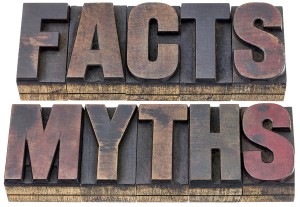
(6) Common Myths Regarding Traumatic Brain Injuries
 Though most people have heard of a concussion, many people may not fully understand the fact about traumatic brain injuries (TBI).1 The following is meant to dispel some commonly believed myths regarding this serious injury.
Though most people have heard of a concussion, many people may not fully understand the fact about traumatic brain injuries (TBI).1 The following is meant to dispel some commonly believed myths regarding this serious injury.
- You have to hit your head to receive a TBI. Though TBIs are most often associated with direct trauma to the head—often from falling or from hitting your head on an object—not all TBI victims have hit their heads. Instead, a TBI can occur when a victim’s head is sharply jolted or is suddenly accelerated or decelerated. With such a jolt, the brain can knock against the inside of the skull, which can cause significant damage to the brain tissue. At times, the brain will hit the skull on one side and then jostle to hit the skull on the other side, causing TBI in two different places. This is referred to as coup contre coup and does not require any direct trauma to the head.
- Less serious TBI cannot cause disabilities. Though a less severe TBI—such as a concussion—often does not have the long-term effects of a severe TBI, the temporary symptoms can still be debilitating and can cause serious challenges for a victim. About 300,000 people are admitted to hospitals per year for mild TBI and victims can experience severe depression, confusion, and other temporarily disabling conditions. These issues can cause trouble with a victim’s family, friends, jobs, and more and can therefore be quite disabling.
- TBI victims will notice immediate signs and symptoms. Some defense attorneys try to argue that, if an accident victim does not immediately complain of TBI symptoms, they could not have received a TBI in the auto accident. However, medical research has shown that some victims may take hours or even a day or two to demonstrate noticeable symptoms of a TBI. Other victims may not recognize symptoms such as fatigue or headaches as related to TBI and, therefore, may not seek medical attention right away. Finally, many symptoms become noticeable when a victim tries to return to school or work and realizes they are suffering from more difficulties than they previously believed.
- The effects of TBI must fit a particular pattern. In the past, many doctors failed to diagnose TBI in accident victims because the results of a neuropsychological test did not conform with particular patterns. However, in recent years, medical professionals have realized that even two individuals with similar brain injuries may show different neurological effects and symptoms.
- A victim must lose consciousness to suffer a TBI. Often, victims of mild TBI may simply suffer from confusion or a dazed period and may not lose consciousness at all. Of course, staying conscious does not mean that your brain tissue has not been damaged. Other victims may lose consciousness for only a few seconds—such a short period of time that no one around even notices.
- Everyone fully recovers from a mild TBI. Many defense attorneys try to present the viewpoint that every victim of a TBI will experience a complete recovery in a relatively short period of time and, therefore, they do not deserve substantial financial compensation. However, research shows that many victims suffer from chronic symptoms caused by post-concussive syndrome.2 Even if a victim does not develop post-concussive syndrome, they can still take months to heal or their healing can remain permanently incomplete, causing cognitive and behavioral complications for the long-term. Additionally, after any type of TBI, your chances for a second, more serious TBI and second-impact syndrome3 increase, often permanently. This means even a mild TBI can put you at greater risk of injury in the future for the rest of your life.
Contact an experienced Clearwater brain injury lawyer for a free consultation
If you have suffered any type of blow or jolt to the head, your first step should always be to obtain the medical evaluation and treatment necessary to properly diagnose a TBI and any related symptoms or complications. Next, you should not hesitate to contact an experienced brain injury attorney as soon as possible. Call the Dolman Law Group today at 727-451-6900 for a free consultation.
Dolman Law Group
800 North Belcher Road
Clearwater, FL 33756
727-451-6900
https://www.dolmanlaw.com/legal-services/brain-injury-attorneys/
References:
1 http://www.cdc.gov/TraumaticBrainInjury/
2 http://www.mayoclinic.org/diseases-conditions/post-concussion-syndrome/basics/definition/con-20032705
3 http://www.ncbi.nlm.nih.gov/pmc/articles/PMC2672291/





